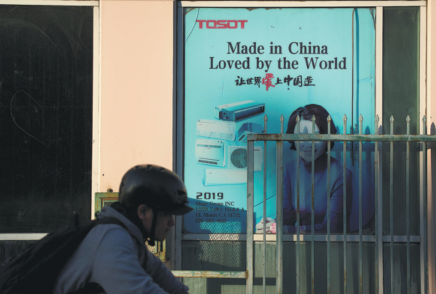Manufacturers in US brace for a supply shock
Firms face limited alternatives as tariffs increased on capital goods from China

Manufacturers and companies across the United States — who collectively spend billions of dollars every year importing durable, production-critical machinery from China — could soon face higher prices that would affect their operating margins and stifle future investments, experts warn.
"Given the trade and supply chain structure of the US economy, the tariffs will largely be imposed on equipment and inputs," said Tom Fullerton, an economist and professor at The University of Texas at El Paso.
"Unfortunately, that will damage operating margins for many businesses, increase the risk of a business cycle downturn and raise inflation."
Last year, the US imported about $1.1 trillion worth of capital goods — roughly three times the value of domestic orders for similar equipment, according to the Bureau of Labor Statistics.
Capital goods refer to essential machinery or assets valued at more than $5,000, used across industries including manufacturing and construction to generate income. These goods typically last more than a year, and the bulk are sourced from China.
However, as the tit-for-tat trade war revs up, US tariffs on Chinese imports now range from a minimum of 145 percent to as high as 245 percent on certain goods. In response, China has raised its additional tariffs on US products to 125 percent.
The situation is of particular concern to US manufacturers — a vital sector that contributes $2.65 trillion to the economy, accounts for 10.3 percent of the GDP and employs nearly 13 million people, according to US Commerce Department data.
Over the past 20 years, China has become a major player in exporting and importing capital goods. Its top exports in this category include large gas turbines, electronic components, machinery and transport equipment, while its major imports consist of petroleum oil, iron ore and integrated circuits.
Stifling growth
Kyle Pomerleau, a senior fellow at the American Enterprise Institute in Washington, warned that US tariffs could stifle growth and investment in US businesses that are heavily reliant on capital goods.
Tariffs on capital goods not only "raise the overall cost of investment, but they also distort the relative price of different types of investment made by businesses", he said.
Neel Kashkari, president and CEO of the Federal Reserve Bank of Minneapolis, wrote in an essay that in the short run, tariffs, which he says act like a consumption tax on US consumers and firms, could result in investments being lower, because the prices paid for imported capital goods will be higher.
"The large increase in tariffs raises the prices firms will pay for capital goods sourced from abroad, and the significant increase in economic uncertainty will likely reduce firms' desire to invest."
US orders rose in February, according to Commerce Department figures, likely boosting capital expenditure in the first quarter, Reuters reported. Orders for machinery climbed 0.2 percent in February, and those for transportation equipment increased 1.5 percent.
US President Donald Trump has repeatedly said one of his key goals with tariffs is to bring back manufacturing to the US, but economists say this could take some time, while noting the growing use of automation.
Sourcing problems
Carmakers have already spoken out about the difficulty of sourcing highly specialized things domestically, and not from Asia or elsewhere.
Last month, Ford applied for a tariff exemption over a specific tool used in making electric vehicle battery cells.
"We cannot obtain comparable equipment from sources in the US," Ford said.
Tesla, whose CEO Elon Musk is a Trump adviser, also filed for a similar exemption.
Trump said on Monday that he was considering an exemption for automakers as car companies may need "a little bit of time" to transition to US-made parts.
The US imported $438.9 billion worth of goods from China last year, a 2.8 percent increase from the previous year, the Office of the United States Trade Representative said.
Of that total, at least $127 billion consisted of electrical and electronic equipment, while $85 billion covered boilers, machinery and nuclear reactors.
Notably, a Goldman Sachs report seen by CNBC found that for 36 percent of US imports from China, more than 70 percent can only be sourced from a specific Chinese supplier — making them a specialist in that trade.
In contrast, just 10 percent of Chinese imports from the US are completely reliant on a US supplier, the report said.
In most sectors, US companies would need years before they could match Asian expertise.
Over the weekend, Trump created a carve-out from the tariffs on smartphones, computers and some other electronics imported largely from China. The exclusion applies only to "reciprocal tariffs".
China's Commerce Ministry said on Sunday that it was a "small step by the US to correct its wrong practice of unilateral 'reciprocal tariffs'."
The ministry said earlier that if the US continues to play its tariff numbers game, then China will not respond.

Today's Top News
- China urges Japan to stop challenging intl bottom line with its nuclear ambitions
- US arms sales to Taiwan a dangerous gambit: Editorial flash
- Taiwan opposition lawmakers announce plan to impeach Lai Ching-te
- Boosting consumption will be key in 2026
- No one should remain silent accomplice of racism
- Hainan FTP opens fast lane






























